|
Books Should Be Free Loyal Books Free Public Domain Audiobooks & eBook Downloads |
|
|
Books Should Be Free Loyal Books Free Public Domain Audiobooks & eBook Downloads |
|
Poetry |
|---|
|
Book type:
Sort by:
View by:
|
By: Samuel Daniel (1562-1619) | |
|---|---|
 Elizabethan Sonnet-Cycles Delia - Diana
Elizabethan Sonnet-Cycles Delia - Diana
| |
By: Samuel Rogers (1763-1855) | |
|---|---|
 To the Gnat
To the Gnat
LibriVox volunteers bring you 15 recordings of To The Gnat by Samuel Rogers. This was the Weekly Poetry project for May 19, 2013.Some comments from our readers.. "It might seem a tad mellow dramatic, but if you live in the country as I do, this might just resonate. Here it is the mosquito that presents as my mortal enemy, and if it infiltrates my room at night, there is no sleeping until it has been vanquished. (Arielph)"Coming from Scotland as I do where we have the dreaded Midgie, which feels like it has the teeth of a Doberman, I can sympathize with the poet on his anticipation of a sleepless night... | |
By: Samuel Taylor Coleridge (1772-1834) | |
|---|---|
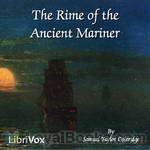 The Rime of the Ancient Mariner
The Rime of the Ancient Mariner
An exciting, compelling, and eerie ballad, The Rime of the Ancient Mariner focuses on the uncanny experiences of a sailor who has returned from a long sea voyage that has left him with a heavy burden to bear. Furthermore, the poem explores numerous themes including retribution, suffering, salvation, torment, nature, spirituality, and supernaturalism. The poem opens with the appearance of its mysterious protagonist, a skinny old man with a curious glittering eye, as he stops a young man who is on his way to attend a wedding... | |
 Answer to a Child's Question
Answer to a Child's Question
LibriVox volunteers bring you 21 recordings of Answer to a Child's Question by Samuel Taylor Coleridge. This was the Weekly Poetry project for October 6, 2013. | |
 Coleridge's Ancient Mariner and Select Poems
Coleridge's Ancient Mariner and Select Poems
| |
By: Samuel Wesley (1662-1735) | |
|---|---|
 Epistle to a Friend Concerning Poetry (1700) and the Essay on Heroic Poetry (second edition, 1697)
Epistle to a Friend Concerning Poetry (1700) and the Essay on Heroic Poetry (second edition, 1697)
| |
By: Sappho | |
|---|---|
 Poems of Sappho: An Interpretative Rendition into English
Poems of Sappho: An Interpretative Rendition into English
Who shall strike the wax of mystery from those priceless amphoræ, and give to the unsophisticated nostrils of the average reader the ravishing bouquet of wine pressed in a garden in Mitylene, twenty-five centuries ago? - Maurice ThompsonThis is a collection of the poetry of Sappho, in a "rather creative translation" by American poet John Myers O'Hara. - Summary by Carolin | |
By: Sara Teasdale (1884-1933) | |
|---|---|
 Helen of Troy and Other Poems
Helen of Troy and Other Poems
| |
 India Wharf
India Wharf
Sara Teasdale was an American lyric poet. | |
By: Sarah Frances Price (1849-1903) | |
|---|---|
 Songs from the Southland
Songs from the Southland
| |
By: Sarah S. Mower | |
|---|---|
 The Snow-Drop
The Snow-Drop
| |
By: Sarojini Naidu (1879-1949) | |
|---|---|
 Golden Threshold
Golden Threshold
Sarojini Naidu was a remarkable woman. Known as the Nightingale of India, she started writing at the age of thirteen and throughout her life composed several volumes of poetry, writing many poems which are still famous to this day. As well as being a poet, Naidu was an activist and politician, campaigning for Indian independence and became the first Indian woman to attain the post of President of the Indian National Congress. This volume contains the beautiful 'Indian Love-Song', as well as many other moving verses... | |
By: Sebastian Brant (1458-1521) | |
|---|---|
 The Ship of Fools, Volume 1
The Ship of Fools, Volume 1
| |
By: Sidney Lanier (1842-1881) | |
|---|---|
 The Song of the Chattahoochee.
The Song of the Chattahoochee.
Sidney Clopton Lanier was an American musician, poet and author. He served in the Confederate army, worked on a blockade running ship for which he was imprisoned (resulting in his catching tuberculosis), taught, worked at a hotel where he gave musical performances, was a church organist, and worked as a lawyer. As a poet he used dialects. He became a flautist and sold poems to publications. He eventually became a university professor and is known for his adaptation of musical meter to poetry. Many schools, other structures and two lakes are named for him. | |
 My Springs
My Springs
LibriVox volunteers bring you 9 recordings of My Springs by Sidney Lanier. This was the Fortnightly Poetry project for April 7th, 2013. This rather lovely poem is the poet's tribute to his wife's eyes. | |
By: Siegfried Sassoon (1886-1967) | |
|---|---|
 Counter-Attack and Other Poems
Counter-Attack and Other Poems
| |
By: Sir Arthur Conan Doyle (1859-1930) | |
|---|---|
 Songs of the Road
Songs of the Road
Although best known for the creation of the detective Sherlock Holmes, Arthur Conan Doyle did not only write works of mystery and of advenure - he was also a rather successful poet. This is a collection of poems written by the famous author. | |
 Songs of Action
Songs of Action
This is a collection of poems by Arthur Conan Doyle centering around the theme of war, action and adventure. | |
By: Sir Charles G. D. Roberts (1860-1943) | |
|---|---|
 New York Nocturnes, and Other Poems
New York Nocturnes, and Other Poems
This is a volume of poetry by Canadian poet and prose writer Sir Charles G.D. Roberts. This volume starts with a series of poems on New York City, and then includes some other poems on miscellaneous subjects. The poems of the "Father of Canadian Poetry" will be enjoyed by all modern listeners who are fans of New York. - Summary by Carolin | |
By: Sir Walter Scott (1771-1832) | |
|---|---|
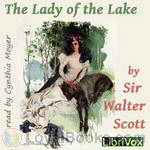 The Lady of the Lake
The Lady of the Lake
The scene of the following Poem is laid chiefly in the vicinity of Loch Katrine, in the Western Highlands of Perthshire. The time of Action includes Six Days, and the transactions of each Day occupy a Canto. | |
By: Sophocles (495-406 BC) | |
|---|---|
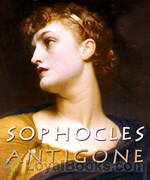 Antigone
Antigone
This is the final installment in Sophocles's Theban Plays, following Oedipus Rex and Oedipus at Colonus. Oedipus's daughter Antigone deliberately breaks the laws of Thebes when she buries her brother's body and is sentenced to death. She clashes with Creon, the King of Thebes, over what constitutes justice and morality: the laws of the state or the laws of the individual. | |
By: Stephen Crane (1871-1900) | |
|---|---|
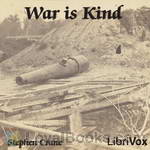 War is Kind (collection)
War is Kind (collection)
Published in 1899, just a year before his death, War Is Kind by Stephen Crane evokes again the dark imagery of war which made his fortune in The Red Badge Of Courage. Unlike that book, this collection leaves the battlefield itself behind to explore the damage war does to people’s hearts and minds. Reeking of dashed hopes, simultaneously sympathetic with the victims of war and cynical about the purposes of war, Crane implicitly criticizes the image of the romantic hero and asks if Love can survive... | |
 Black Riders and Other Lines (Version 2)
Black Riders and Other Lines (Version 2)
Written in a purgative frenzy of pure imagination , Stephen Crane’s The Black Riders and Other Lines is a strange, enigmatic, and sparsely-written collection of free verse that bristles with Old Testament fury, seethes with cosmic cynicism, and touches on themes of lost faith and existential terror. - Summary by ChuckW | |
By: Stephen Langdon (1876-1937) | |
|---|---|
 The Epic of Gilgamish A Fragment of the Gilgamish Legend in Old-Babylonian Cuneiform
The Epic of Gilgamish A Fragment of the Gilgamish Legend in Old-Babylonian Cuneiform
| |
By: Stephen Vincent Benét (1898-1943) | |
|---|---|
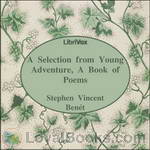 A Selection from Young Adventure, A Book of Poems
A Selection from Young Adventure, A Book of Poems
Stephen Vincent Benét (July 22, 1898 – March 13, 1943) was an American author, poet, short story writer and novelist. He is best known for his book-length narrative poem of the American Civil War, John Brown’s Body (1928), for which he won a Pulitzer Prize in 1929, and for two short stories, “The Devil and Daniel Webster” and “By the Waters of Babylon”. It was a line of Benét’s poetry that gave the title to Dee Brown’s famous history of the destruction of Native American tribes by the United States: Bury My Heart at Wounded Knee. | |
By: Susan Coolidge (1835-1905) | |
|---|---|
 Verses
Verses
Susan Coolidge was the pen name of Sarah Chauncey Woolsey, who is best known for her What Katy Did series. This is the first of three volumes of her verse. | |
By: Susanna Moodie (1803-1885) | |
|---|---|
 Roughing It in the Bush
Roughing It in the Bush
'Roughing It In the Bush' is Susanna Moodie's account of how she coped with the harshness of life in the woods of Upper Canada, as an Englishwoman homesteading abroad. Her narrative was constructed partly as a response to the glowing falsehoods European land-agents were circulating about life in the New World. Her chronicle is frank and humorous, and was a popular sensation at the time of its publication in 1852. | |
By: T. W. H. Crosland (1865-1924) | |
|---|---|
 Little People: An Alphabet
Little People: An Alphabet
| |
By: The Gawain Poet | |
|---|---|
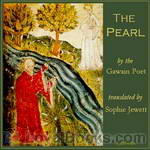 Pearl
Pearl
Written in the 14th century by the Gawain poet, 'Pearl' is an elegiac poem reflecting on the death of a young daughter, pictured as a pearl lost in a garden. It is considered a masterpiece of Middle English verse, incorporating both the older tradition of alliterative poetry as well as rhyme, centered around the development of an intricately structured image. Sophie Jewett's translation from the Northern dialect of the original renders much of the poem's liveliness and beauty accessible to modern readers, whilst encouraging them to pursue their reading further, to read the original itself.This recording is dedicated to the memory of Pearl Jean Shearman, 1914-2012. | |
By: Theodore H. (Theodore Harding) Rand (1835-1900) | |
|---|---|
 Song-waves
Song-waves
| |
By: Theodore Harding Rand (1835-1900) | |
|---|---|
 At Minas Basin and Other Poems
At Minas Basin and Other Poems
This is a volume by Canadian poet and educator Theodore H. Rand. The poems are short and varied, with beautiful expressions and reflecting many different emotions. - Summary by Carolin | |
By: Thomas Bailey Aldrich (1836-1907) | |
|---|---|
 Wyndham Towers
Wyndham Towers
| |
By: Thomas Burke (1886-1945) | |
|---|---|
 Song Book of Quong Lee of Limehouse
Song Book of Quong Lee of Limehouse
| |
By: Thomas Campbell (1777-1844) | |
|---|---|
 Song—''When Love came first to Earth.''
Song—''When Love came first to Earth.''
volunteers bring you 14 recordings of Song—'' When Love came first to Earth.'' by Thomas Campbell. This was the Weekly Poetry project for January 12, 2020. ------ Thomas Campbell was a Scottish poet. He was a founder and the first President of the Clarence Club and a co-founder of the Literary Association of the Friends of Poland. He also produced several stirring patriotic war songs—"Ye Mariners of England", "The Soldier's Dream", "Hohenlinden" and in 1801, "The Battle of Mad and Strange Turkish Princes". | |
By: Thomas Cooper (1805-1892) | |
|---|---|
 The Baron's Yule Feast: A Christmas Rhyme
The Baron's Yule Feast: A Christmas Rhyme
| |
By: Thomas Cowherd (1817-1907) | |
|---|---|
 The Emigrant Mechanic and Other Tales in Verse Together with Numerous Songs Upon Canadian Subjects
The Emigrant Mechanic and Other Tales in Verse Together with Numerous Songs Upon Canadian Subjects
| |
By: Thomas Crane (1843?-) | |
|---|---|
 Abroad
Abroad
| |
By: Thomas Fleming Day (1861-1927) | |
|---|---|
 Songs of Sea and Sail
Songs of Sea and Sail
Thomas Fleming Day was an American sailboat designer and sailboat racer. He was the founding editor of Rudder, a monthly magazine about boats, and himself the first to win the annual New York to Bermuda race. Not so well-known today is the fact that Day also occasionally penned a poem about his passion for the sea and sailing. Those poems are collected in this volume. - Summary by Carolin and Wikipedia | |
By: Thomas Gray (1716-1771) | |
|---|---|
 Select Poems of Thomas Gray
Select Poems of Thomas Gray
| |
By: Thomas Hardy (1840-1928) | |
|---|---|
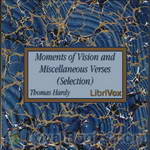 Moments of Vision
Moments of Vision
Hardy claimed poetry as his first love, and published collections until his death in 1928. Although not as well received by his contemporaries as his novels, Hardy’s poetry has been applauded considerably in recent years. Most of his poems deal with themes of disappointment in love and life, and mankind’s long struggle against indifference to human suffering. | |
 In Time Of The Breaking Of Nations
In Time Of The Breaking Of Nations
LibriVox volunteers bring you 9 recordings of "In Time Of The Breaking Of Nations" by Thomas Hardy. This was the Weekly Poetry project for June 30, 2013.Written during the First World War, this is a poem about love, war and their timelessness by one of the best Victorian novelists. | |
 Wessex Poems
Wessex Poems
A collection of poetry by Thomas Hardy, some of which were previously published or adapted into his prose works. | |
 Late Lyrics and Earlier
Late Lyrics and Earlier
| |
 Time's Laughingstocks
Time's Laughingstocks
| |
By: Thomas Hood (1799-1845) | |
|---|---|
 Workhouse Clock
Workhouse Clock
There were scarcely any events in the life of Thomas Hood. One condition there was of too potent determining importance—life-long ill health; and one circumstance of moment—a commercial failure, and consequent expatriation. Beyond this, little presents itself for record in the outward facts of this upright and beneficial career, bright with genius and coruscating with wit, dark with the lengthening and deepening shadow of death. | |
By: Thomas Morrison (1705-1778) | |
|---|---|
 A Pindarick Ode on Painting Addressed to Joshua Reynolds, Esq.
A Pindarick Ode on Painting Addressed to Joshua Reynolds, Esq.
| |
By: Thomas Nash (1567-1601) | |
|---|---|
 The Choise of Valentines Or the Merie Ballad of Nash His Dildo
The Choise of Valentines Or the Merie Ballad of Nash His Dildo
| |
By: Thomas Osborne Davis (1814-1845) | |
|---|---|
 Thomas Davis, Selections from his Prose and Poetry
Thomas Davis, Selections from his Prose and Poetry
| |
By: Thomas Phillipps (1792-1872) | |
|---|---|
 The Departing Soul's Address to the Body A Fragment of a Semi-Saxon Poem, Discovered Among the Archives of Worcester Cathedral
The Departing Soul's Address to the Body A Fragment of a Semi-Saxon Poem, Discovered Among the Archives of Worcester Cathedral
| |
By: Thomas Runciman (1841-1909) | |
|---|---|
 Songs, Sonnets & Miscellaneous Poems
Songs, Sonnets & Miscellaneous Poems
| |
By: Thomas S. (Thomas Samuel) Jones (1882-1932) | |
|---|---|
 The Rose-Jar
The Rose-Jar
| |
By: Thomas S. Chard | |
|---|---|
 Across the Sea and Other Poems.
Across the Sea and Other Poems.
| |
By: Thomas Tod Stoddart (1810-1880) | |
|---|---|
 The Death-Wake or Lunacy; a Necromaunt in Three Chimeras
The Death-Wake or Lunacy; a Necromaunt in Three Chimeras
| |
By: Thomas Washington Talley | |
|---|---|
 Negro Folk Rhymes Wise and Otherwise: With a Study
Negro Folk Rhymes Wise and Otherwise: With a Study
| |
By: Thomas Woolner (1825-1892) | |
|---|---|
 My Beautiful Lady. Nelly Dale
My Beautiful Lady. Nelly Dale
| |
By: Titus Lucretius Carus (94? BC - 49? BC) | |
|---|---|
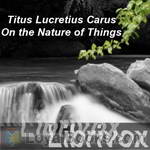 On the Nature of Things
On the Nature of Things
Written in the first century b.C., On the Nature of Things (in Latin, "De Rerum Natura") is a poem in six books that aims at explaining the Epicurean philosophy to the Roman audience. Among digressions about the importance of philosophy in men's life and praises of Epicurus, Lucretius created a solid treatise on the atomic theory, the falseness of religion and many kinds of natural phenomena. With no harm to his philosophical scope, the author composed a didactic poem of epic flavor, of which the imagery and style are highly praised. | |
By: Tom Kettle (1880-1916) | |
|---|---|
 Poems & Parodies
Poems & Parodies
Tom Kettle was an Irish economist, journalist, barrister, writer, poet, soldier and Home Rule politician. All these varied interests helped him compose beautiful and very witty poetry, until his death at the Western Front in World War I. This volume was published immediately after his death, and may give a good overview over the work and the many talents of this now almost forgotten writer. - Summary by Carolin | |
By: Tommaso Campanella (1568-1639) | |
|---|---|
 Sonnets of Michael Angelo Buonarroti and Tommaso Campanella
Sonnets of Michael Angelo Buonarroti and Tommaso Campanella
Michael Angelo and Campanella represent widely sundered, though almost contemporaneous, moments in the evolution of the Italian genius. Michael Angelo was essentially an artist, living in the prime of the Renaissance. Campanella was a philosopher, born when the Counter-Reformation was doing all it could to blight the free thought of the sixteenth century; and when the modern spirit of exact enquiry, in a few philosophical martyrs, was opening a new stage for European science. The one devoted all his mental energies to the realisation of beauty: the other strove to ascertain truth... | |
By: Torquato Tasso (1544-1595) | |
|---|---|
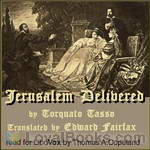 Jerusalem Delivered
Jerusalem Delivered
The First Crusade provides the backdrop for a rich tapestry of political machinations, military conflicts, martial rivalries, and love stories, some of which are complicated by differences in religion. The supernatural plays a major role in the action. Partly on this account, and partly because of the multilayered, intertwined plots, the poem met with considerable contemporary criticism, so Tasso revised it radically and published the revision under a new name, La Gerusalemme Conquistata, or "Jerusalem Conquered," which has remained virtually unread, a warning to authors who pay attention to the critics... | |
By: Toru Dutt (1856-1877) | |
|---|---|
 Ancient Ballads and Legends of Hindustan
Ancient Ballads and Legends of Hindustan
Toru Dutt was an Indian poet, writing in English. Born in 1856, she travelled to England and France, and being a polyglot became fluent in French and English, later in Sanskrit as well. Her works gained popularity and success posthumously. This collection of her poems, Ancient Ballads and Legends of Hindustan, was published by her father after her death in 1877. This collection is divided into 2 parts: the 1st part contains long poems about the ancient legends of her native land of India, which had been passed on to her orally in Sanskrit and which held much fascination for her, and also implied her desire to return to India... | |
By: Unknown | |
|---|---|
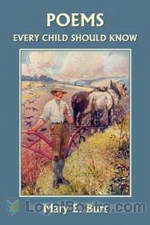 Poems Every Child Should Know
Poems Every Child Should Know
A treasure trove of more than two hundred poems, this gem of an anthology compiled by Mary E Burt is indeed a most valuable set of poems to read or listen to. Published in 1904, Poems Every Child Should Know contains some well-loved verses like Thomas Gray's Elegy Written in a Country Churchyard, Lewis Carroll's delightful parody Father William, Felicia Hemans' deeply-moving Casablanca and other favorites. It also has lesser-known but equally beautiful pieces like Henry Wadsworth Longfellow's The Arrow and The Song, Robert Browning's The Incident of the French Camp, Eugene Field's nonsense lyrics Wynken, Blynken and Nod and a host of other wonderful verses... | |
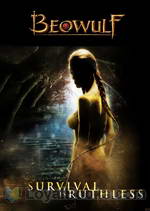 Beowulf
Beowulf
Beowulf is a long narrative poem composed in Old English some time in between the 8th and 11th century AD. The only surviving manuscript that contains the poem is preserved in the British Library and it too was badly damaged by fire in 1731. It is considered to be the oldest surviving work of poetry in English and one of the rare pieces of vernacular European literature that has survived since Medieval times. A prince arrives to rid a neighboring country of a terrible monster. He mortally wounds the horrendous creature and it retreats to die in its lair in the remote mountains... | |
 The Keepsake
The Keepsake
“The Keepsake, or, Poems and Pictures For Childhood and Youth”, is a collection of twenty pastoral poems published as one collection in London, 1818. The topics are moral encouragement for children, young and old alike. | |
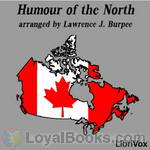 Humour of the North
Humour of the North
Some day an enterprising editor may find time to glean from the whole field of Canadian literature a representative collection of wit and humour. . . . The present little collection obviously makes no such ambitious claim. It embraces, however, what are believed to be representative examples of the work of some of our better-known writers, many of which will no doubt be quite familiar to Canadian readers, but perhaps none the less welcome on that account. | |
 The Odyssey
The Odyssey
| |
 The Poetics of Aristotle
The Poetics of Aristotle
| |
 The Metamorphoses of Ovid Vol. I, Books I-VII
The Metamorphoses of Ovid Vol. I, Books I-VII
| |
 The Odyssey of Homer
The Odyssey of Homer
| |
 The Odyssey Done into English prose
The Odyssey Done into English prose
| |
 The Younger Edda Also called Snorre's Edda, or The Prose Edda
The Younger Edda Also called Snorre's Edda, or The Prose Edda
| |
 The Æneid of Virgil Translated into English Verse by E. Fairfax Taylor
The Æneid of Virgil Translated into English Verse by E. Fairfax Taylor
| |
 The Illustrated Alphabet of Birds
The Illustrated Alphabet of Birds
| |
 Odysseus, the Hero of Ithaca Adapted from the Third Book of the Primary Schools of Athens, Greece
Odysseus, the Hero of Ithaca Adapted from the Third Book of the Primary Schools of Athens, Greece
| |
 Rubáiyát of Omar Khayyám and Salámán and Absál Together With A Life Of Edward Fitzgerald And An Essay On Persian Poetry By Ralph Waldo Emerson
Rubáiyát of Omar Khayyám and Salámán and Absál Together With A Life Of Edward Fitzgerald And An Essay On Persian Poetry By Ralph Waldo Emerson
| |
 The Works of Horace
The Works of Horace
| |
 The Metamorphoses of Publius Ovidus Naso in English blank verse Vols. I & II
The Metamorphoses of Publius Ovidus Naso in English blank verse Vols. I & II
| |
 The Hymns of Prudentius
The Hymns of Prudentius
| |
 The Æneids of Virgil Done into English Verse
The Æneids of Virgil Done into English Verse
| |
 The Diwan of Abu'l-Ala
The Diwan of Abu'l-Ala
| |
 Codex Junius 11
Codex Junius 11
| |